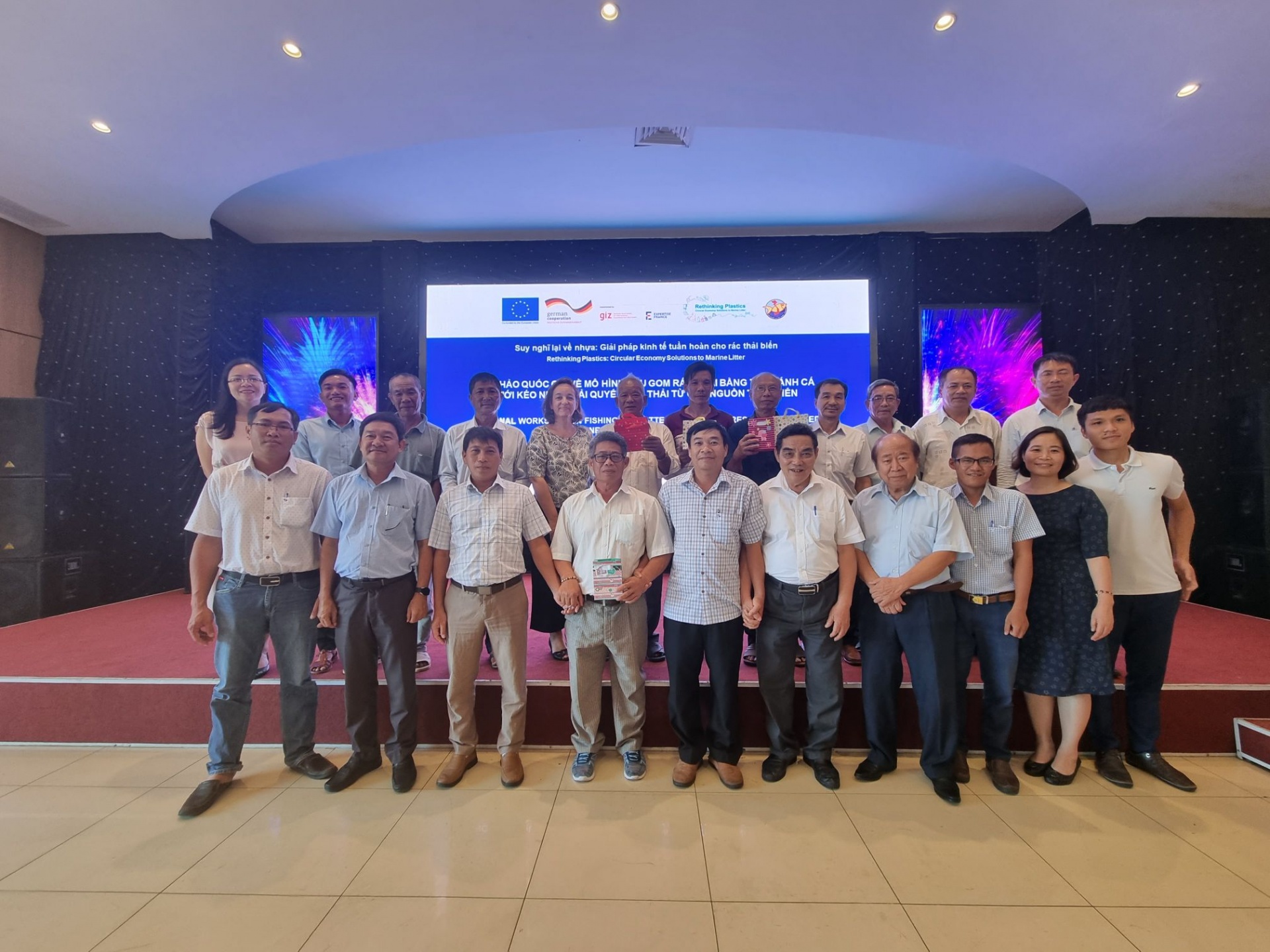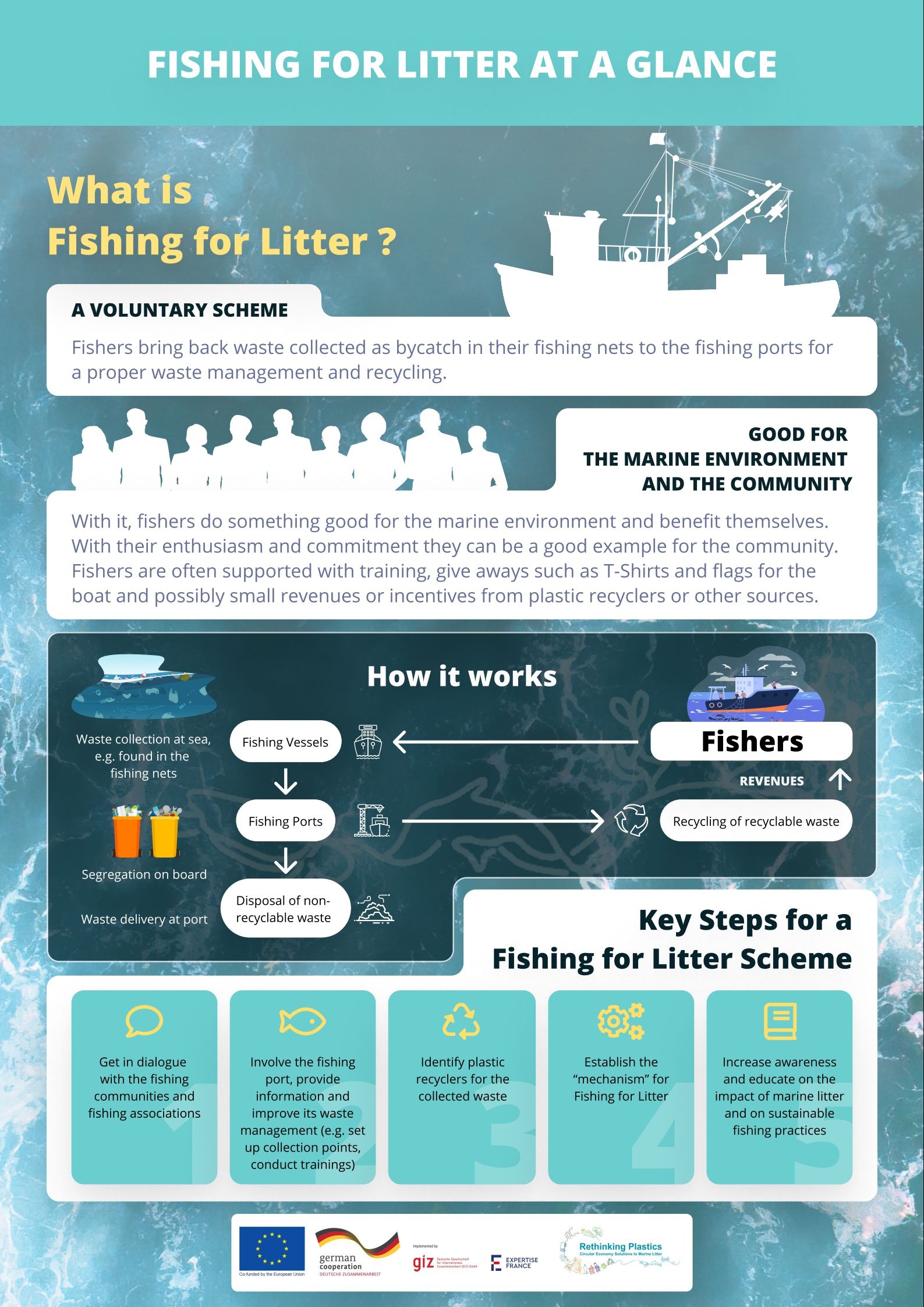Fishers effectively contribute to reducing marine litter
One focus was the pilot project "Fishing for Litter (FfL)", which promotes a scheme for the voluntary collection of marine litter by the fisher community and has been implemented in Phu Yen from March 2021 to May 2022 to assist and encourage the local community to collect and bring back waste to waste collection points onshore.
Specific activities were conducted to raise awareness of fishers about the harmful effects of plastic waste on the environment and the health of aquatic animals and humans.
 |
| Fishermen can contribute effectively to tackling and overcoming the challenge of marine litter |
At the seminar, participants shared lessons learned and discussed the way forward. It was organised by the pilot project partners, the Vietnamese Directorate of Fisheries (DEFISH), the Vietnam Fishery Association (VINAFIS), and the project ‘Rethinking Plastics – Circular Economy Solutions to Marine Litter’, funded by the EU and the German government.
Rui Ludovino, first counsellor of Climate Action, Environment, Employment, and Social Policies at the Delegation of the EU to Vietnam highlighted, “Within the Rethinking Plastics project, we cooperate to avoid, reduce, and better recycle plastics with the ultimate objective to reduce marine litter. Furthermore, we support our partner countries in East- and Southeast Asia on their way towards a circular economy for plastics.”
Ludovino emphasised, “Multiple stakeholders, among them the local fishing communities, can contribute to this change with knowledge and action. A few months ago, I had the opportunity to visit a fishing community in Song Cau in Phu Yen province and learn more about their work, but also their enthusiasm to protect the ocean and their livelihood, which was really inspiring.”
Talking about the role of fishers, Fanny Quertamp, senior advisor of the Rethinking Plastics project continued, “The first principle of the FfL approach is based on the voluntary actions of the fishers. You are here today and you are the key to success. I would like to take this opportunity to thank you all very much. As part of the project, you are the real experts. We have been working together for the last two years. Despite COVID, I would like to highlight very clearly that this project could not reach its purpose without you,” she said.
Nguyen Tri Phuong, deputy director of Phu Yen’s Department of Agriculture and Rural Development, summarised that 37 ships have deployed 240 trips and collected and delivered 6,272kg of marine waste to the fishing ports.
“Awareness of local fishers in Xuan Thanh ward about marine environmental protection has been significantly increased. Captains and crew members have changed their behaviour and actively collected and delivered waste for the project,” Phuong said.
Phu Yen was one of the pilot locations in which the Rethinking Plastics project has conducted successful trials to support FfL approaches. Besides Vietnam, similar activities also took place in China, Indonesia, and Thailand.
The work in Vietnam, assisted by VINAFIS, focused on reducing marine debris and strengthening its management of small-scale fishing vessels and the communities with research, training, information, exchange, and practical guidelines.
 |
According to Nguyen Tu Cuong, project team leader at VINAFIS, the results achieved by the Fishing for Litter scheme show that fishers can contribute effectively to tackling and overcoming the challenge of marine litter.
“However, Vietnam needs to find incentivising solutions to engage fishers long-term in collecting marine litter and bringing it to the port, where waste can be sorted, recyclable waste can be sold to collectors, and non-recyclable waste can be transferred to the landfill,” Phuong said.
Quertamp further commented that after the initial results achieved by the pilot project, involved experts proposed to the Directorate of Fisheries at the Ministry of Agriculture and Rural Development to consider using these results in the waste collection process and disseminate lessons learned to other coastal provinces.
In addition, a communication report has been produced under the project that provides an overview and analysis of the current situation of the fishing industry and the management of ocean plastic waste in Vietnam, as well as a review of existing communication material. In addition, it proposes potential target groups, and effective communication channels to change the perception and behaviour of the target audience.
The Rethinking Plastics project is implemented by Expertise France and the GIZ with financial support from the European Union and the German Federal Ministry for Economic Cooperation and Development. It supports seven countries in East and Southeast Asia, among them Vietnam, focusing on the circular economy, plastic waste, and marine litter reduction.
For more information, please contact:
Fanny Quertamp, senior advisor at ‘Rethinking Plastics’
Email: fanny.quertamp@expertisefrance.fr;
Mobile: +84 0904 26 77 13
rethinkingplastics.eu
What the stars mean:
★ Poor ★ ★ Promising ★★★ Good ★★★★ Very good ★★★★★ Exceptional
Related Contents
Latest News
More News
- Bac Ai Pumped Storage Hydropower Plant to enter peak construction phase (January 27, 2026 | 08:00)
- ASEAN could scale up sustainable aviation fuel by 2050 (January 24, 2026 | 10:19)
- 64,000 hectares of sea allocated for offshore wind surveys (January 22, 2026 | 20:23)
- EVN secures financing for Quang Trach II LNG power plant (January 17, 2026 | 15:55)
- PC1 teams up with DENZAI on regional wind projects (January 16, 2026 | 21:18)
- Innovation and ESG practices drive green transition in the digital era (January 16, 2026 | 16:51)
- Bac Ai hydropower works stay on track despite holiday period (January 16, 2026 | 16:19)
- Fugro extends MoU with PTSC G&S to support offshore wind growth (January 14, 2026 | 15:59)
- Pacifico Energy starts commercial operations at Sunpro Wind Farm in Mekong Delta (January 12, 2026 | 14:01)
- Honda launches electric two-wheeler, expands charging infrastructure (January 12, 2026 | 14:00)

 Tag:
Tag:


























 Mobile Version
Mobile Version